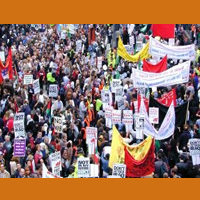COMMENTS ON “OUR MONEY”
Comments on Our Money: Towards a New Monetary System
Thus far no comments on have been received on the English version of the book Our Money. Two comments are available on the Dutch version, by George Van Houts, theatre maker and activist, and Reinhold Widemann, retired economics professor and author of various books on money, the monetary system and banking.
Comments of George van Houts – theatre maker and activist
George van Houts is a well-known Dutch writer of successful plays, among others on banking and money. He is also one of the driving forces behind the Dutch Foundation Ons Geld (translation: Our Money) and the Burgerinitiatief Ons Geld (translation: Citizens Initiative Our Money), a successful public effort to get the issue of our monetary system and possible alternatives on the agenda of the Second Chamber of Parliament.
This is what Mr. Van Houts said about the booklet Ons Geld: What an excellent and well written booklet! However, one aspect of our story is not addressed: interest. How do we handle that?
The author of the booklet reacted as follows:
The booklet discusses interest rates mainly in terms of the need for growth (to repay debt and interest), an unavoidable consequence of money creation by private, profit-oriented banks. An obligation that would disappear in a system based on public money creation, in which part of the money created can be made available interest-free to the State for, for example, investment in the transition to an ecologically sustainable economy and society.
The booklet does not clearly state whether companies, citizens and the government should still pay interest on loans. There is not much on this topic in the documentation of Positive Money and other sources. However, it may be assumed that interest rates will remain linked to credit, especially if extended by profit-oriented organizations such as private banks or, for example, cooperatives. After all, lending and loan management carry a cost. The interest rate may be expected to cover at the very least the cots of extending and managing the loans.
The question is whether we should continue with private banking. The booklet argues for a public banking system, possibly next to private banks, but without the latter having the right, as now, to create money by providing loans. More information on public vs. private banking here (SUB-PAGE 6.7: BANKING: PUBLIC OR PRIVATE). On the other hand, providing credit implies charging interest which implies the need for growth – something we have to get away from, considering our resources are finite.
Public money creation would allow providing interest-free loans for socially useful investments, for example to private companies that build green infrastructure. At the same time interest could be charged on loans for less useful and non-sustainable items – the less environmentally sustainable, the higher the interest. This aspect needs further elaboration.
Comments of Reinold Widemann – economics professor (retired) and author
An extensive comment by retired economics professor Reinold Widemann, who authored several publications on money and banking, and an extensive response by the author of Our Money can be found here. His comments are of interest as they may be assumed to be fairly representative of the mainstream economic response to the book.
Mr. Widemann’s comments are critical, especially as far as increasing the role of government in money creation and money management is concerned. However, the fact that he has read the book and has provided an extensive commentary is positive and indicates the willingness to both discuss and consider alternatives to the current monetary system. Nonetheless public money creation as suggested in the booklet Our Money, by the Foundation Our Money and by the initiators of the Citizens’ Initiative is anathema, in the sense that Mr. Widemann’s commentary can be seen as typical of benevolent economists and those who consider themselves economically literate. Very briefly summarized it comes down to three beliefs which are presented below in italics and then, also very briefly, refuted in normal print.
- Government cannot be trusted to manage the money supply reliably: it lacks the expertise, and politicians will abuse the privilege, as history shows. This viewpoint ignores the current existence and role of central banks, which have an important role in managing the money supply, operate independently from politicians, and are generally well regarded even by economists. And it is historically false: thorough analysis has shown that in modern history major financial crises were mostly caused by the private sector, not by governments.
- The market is the only entity that can reliably balance the money supply with supply and demand and thus determine the economy’s need for money. This conveniently ignores the excessive creation of money through disproportionate debt creation that started in the 1990s. Most of the newly created money ended up in financial markets to be used for speculation, leading to various financial crises – lastly in 2007-2008. Likewise, since 2010 the basis is being laid for the next financial and economic crisis.
- Therefore there is not only no need to change the monetary system; it is also highly risky to do so and should therefore be avoided. This belief ignores the various financial and economic crises caused by the financial sector, in particular banks, since the 1990s. And it ignores the present risk of a new crisis occurring. A crisis that is likely to be even greater than the 2007 one – with governments less able to address the consequences by bailing out the banks once more.



